UK geothermal potential
The geothermal resource of Permo-Triassic basins in the UK
Active research projects
Piloting Underground Storage of Heat in Geothermal Reservoirs (PUSH-IT) is an EU-funded project that aims to improve the understanding, development and acceptance of heat storage technologies. The consortium is led by the Delft University of Technology (TU Delft) and consists of 19 partners.
For more information please contact Andrés González Quirós.
The NERC-funded ‘Hypogene karst: genesis and implications to optimisation of low enthalpy energy resources’ project, led by the University of Manchester, aims to provide a better understanding of the genesis of these karst systems and the potential implications for circulation of deep fluids and low-enthalpy geothermal systems in the UK.
The role of BGS is to support to the speleological, hydrogeological and modelling activities by providing expert knowledge and datasets.
For more information please contact Vanessa Banks.
BGS is a co-investigator in the EPSRC-funded Geothermal Energy from Mines and Solar Geothermal heat Storage (GEMS) project, led by Durham University.
The project will use the UK Geoenergy Observatory in Glasgow to perform field tests to improve the understanding of the flow and transport of heat in flooded underground mines. BGS is also contributing hydrogeological and heat-flow modelling.
For more information please contact Alison Monaghan.
Geothermal Power generated from UK granites or GWatt aims to develop a better understanding of fluid and heat flow in deep fractured rocks in order to improve and encourage the use of geothermal energy in the UK. The project has received £1.8 million in funding from NERC and the consortium is formed by research, business and Government partners, including BGS.
For more information please contact Christopher Rochelle.
This project provides underpinning geoscientific data and knowledge for geothermal resource assessment of the East African Rift. Continental-scale geothermal data compiled by BGS has been incorporated into a Geothermal Atlas for Africa as part of the LEAP-RE EU-funded project.
Previous research projects
REFLECT aimed to improve the understanding of the behaviour and properties of fluids in deep geothermal reservoirs. The project was funded by the EU Horizon 2020 programme. It investigated more than a dozen geothermal fields in Europe, including the United Downs in the UK.
For more information please contact Christopher Rochelle.
This project integrated surface and subsurface geological and geophysical data collected by the oil and gas industry to identify deep geothermal targets in Carboniferous limestone strata across central and southern Great Britain. A 3D static geological model was created and quantified the UK heat-in-place and potentially recoverable heat resource from this geothermal play. BGS also collaborated with the University of Manchester to understand the structural configuration of this unit from onshore to offshore in the East Irish Sea.
For more information please contact Timothy Kearsey.
BGS participated as partner in the EU-funded Managing Urban Shallow geothermal Energy (GEOera-MUSE) project, investigating the resources and possible conflicts of shallow geothermal resources in European urban areas. Among the pilot areas, two were located in the UK: Cardiff (with focus of the city-scale groundwater temperature characterisation to support the development of geothermal energy) and Glasgow.
For more information please contact David Boon.
The Cooperation in Geothermal energy research Europe-Mexico for development of Enhanced Geothermal Systems and Superhot Geothermal Systems (GEMex) project was a collaborative project with partners in Mexico and Europe to develop innovative methods for accessing deep geothermal resources in variable geological formations.
For more information please contact Christopher Rochelle.
The ThermoMap project focused on information for shallow geothermal potential across Europe. The project was co-funded by the EU FP7-ICT Policy Support Programme and involved 12 partners from nine EU member states.
An online tool was produced of the very shallow (down to 10 m) geothermal potential covering an estimation of the superficial deposits in the nine countries involved in this project (Austria, Belgium, France, Germany, Greece, Hungary, Iceland, Romania and the UK).
The project aimed to compare experiences and draw lessons from the shale gas experience in order to develop an approach to governance and community engagement for geothermal energy developments for a just and sustainable energy future.
For more information please contact Corinna Abesser.
By comparing different media, this project aimed to understand to what extent, and why, different types of seismic events in the UK (tectonic and those induced by shale gas and other human activities) are reported differently.
For more information please contact Hazel Napier.
Science briefing papers and selected research
-
- Abesser, C, Gonzalez Quiros, A, and Boddy, J. 2023. The case for deep geothermal energy – unlocking investment at scale in the UK. A deep geothermal energy white paper.
- Abesser, C, Gonzalez Quiros, A, and Boddy, J. 2023. Evidence report supporting the deep geothermal energy white paper : the case for deep geothermal energy – unlocking investment at scale in the UK. Nottingham, UK, British Geological Survey, 134pp. (OR/23/032)
- Who owns geothermal heat?
- Geothermal energy: POST Brief 46
Abesser, C, Schincariol, R A, Raymond, J, García-Gil, A, Drysdale, R, Piatek, A, Giordano, N, Jaziri, N, and Molson, J. 2023. Case studies of geothermal system response to perturbations in groundwater flow and thermal regimes. Groundwater, Vol. 61(2), 255–273. DOI: https://doi.org/10.1111/gwat.13086
Busby, J, Lewis, M, Reeves, H, and Lawley, R. 2009. Initial geological considerations before installing ground source heat pump systems. Quarterly Journal of Engineering Geology and Hydrogeology, Vol. 42(3), 295–306. DOI: https://doi.org/10.1144/1470-9236/08-092
Busby, J, Kingdon, A, and Williams, J. 2011. The measured shallow temperature field in Britain. Quarterly Journal of Engineering Geology and Hydrogeology, Vol. 44(3), 373–387. DOI: https://doi.org/10.1144/1470-9236/10-049
Busby, J. 2014. Geothermal energy in sedimentary basins in the UK. Hydrogeology Journal, Vol. 22(1), 129–141. DOI: https://doi.org/10.1007/s10040-013-1054-4
Busby, J, and Terrington, R. 2017. Assessment of the resource base for engineered geothermal systems in Great Britain. Geothermal Energy, Vol. 5, article 7. DOI: https://doi.org/10.1186/s40517-017-0066-z
Downing, R A, and Gray, D A. 1986. Geothermal resources of the United Kingdom. Journal of the Geological Society, Vol. 143, 499–507. DOI: https://doi.org/10.1144/gsjgs.143.3.049
Farr, G, Busby, J, Wyatt, L, Crooks, J, Schofield, D I, and Holden, A. 2020. The temperature of Britain’s coalfields. Quarterly Journal of Engineering Geology and Hydrogeology, Vol. 54(3). DOI: https://doi.org/10.1144/qjegh2020-109
Fellgett, M, and Monaghan, A A. 2024. User guide : BGS UK Geothermal Catalogue first digital release, legacy data. Nottingham, UK, British Geological Survey, 32pp. (OR/23/060) (Unpublished) https://nora.nerc.ac.uk/id/eprint/537202/
Gillespie, M R, Crane, E J, and Barron, H F. 2013. Potential for deep geothermal energy in Scotland: study volume 1.
Gillespie, M R, Crane, E J, and Barron, H F. 2013. Potential for deep geothermal energy in Scotland: study volume 2.
Gonzalez Quiros, A, MacAllister, Donald J, MacDonald, A, Palumbo-Roe, B, Bearcock, J, O Dochartaigh, B, Callaghan, E, Kearsey, T, Walker-Verkuil, K, and Monaghan, A. 2024. De-risking green energy from mine waters by developing a robust hydrogeological conceptual model of the UK Geoenergy Observatory in Glasgow. Hydrogeology Journal. https://doi.org/10.1007/s10040-024-02778-y
Jones, D J R, Randles, T, Kearsey, T, Pharaoh, T C, and Newell, A. 2023. Deep geothermal resource assessment of early Carboniferous limestones for Central and Southern Great Britain. Geothermics, Vol. 109, 102649. DOI: http://dx.doi.org/10.1016/j.geothermics.2023.102649
Monaghan, A A, Starcher, V, Barron, H F, Shorter, K, Walker-Verkuil, K, Elsome, J, Kearsey, T, Arkley, S, Hannis, S, and Callaghan, E. 2022. Drilling into mines for heat: geological synthesis of the UK Geoenergy Observatory in Glasgow and implications for mine water heat resources. Quarterly Journal of Engineering Geology and Hydrogeology, Vol. 55(1). DOI: https://doi.org/10.1144/qjegh2021-033
Monaghan, A A, Bateson, L, Boyce, A J, Burnside, N M, Chambers, R, de Rezende, R, Dunnet, E, Everett, P A, Gilfillan, S M V, Jibrin, M S, Johnson, G, Luckett, R, MacAllister, D J, MacDonald, A M, Moreau, J W, Newsome, L, Novellino, A, Palumbo-Roe, B, Pereira, R, Smith, D, Spence, M J, Starcher, V, Taylor-Curran, H, Vane, C H, Wagner, T and Walls, D B. 2022. Time zero for net zero: a coal mine baseline for decarbonising heat. Earth Science, Systems and Society, Vol. 2, 10054. DOI: https://doi.org/10.3389/esss.2022.10054
Monaghan, A, and Spence, M. 2023. Decarbonising heat via the subsurface. Geoscientist, 33 (3). 16–21
Pharaoh, T, Jones, D, Kearsey, T, Newell, A, Abesser, C, Randles, T, Patton, A, and Kendall, R. 2021. Early Carboniferous limestones of southern and central Britain: characterisation and preliminary assessment of deep geothermal prospectivity. Zeitschrift der Deutschen Gesellschaft für Geowissenschaften, Vol. 172(3), 227–249. DOI: https://doi.org/10.1127/zdgg/2021/0282
Rollin, K.E. 1987. Catalogue of geothermal data for the land area of the United Kingdom. Third revision: April 1987. Investigation of the Geothermal Potential of the UK. British Geological Survey report WJ/GE/87/007.
Other
- Open-loop GSHP screening tool (England and Wales)
- Heat stored in Britain’s abandoned coal mines (BGS and Mining Remediation Authority)
- Unlocking the deep geothermal energy potential of the Carboniferous Limestone Supergroup by Darren Jones (2021)
- UK legacy geothermal catalogue released in digital format for the first time – British Geological Survey (bgs.ac.uk)
- The heat beneath our feet: BGS field visit to Tuscan geothermal systems – British Geological Survey
Online maps and tools
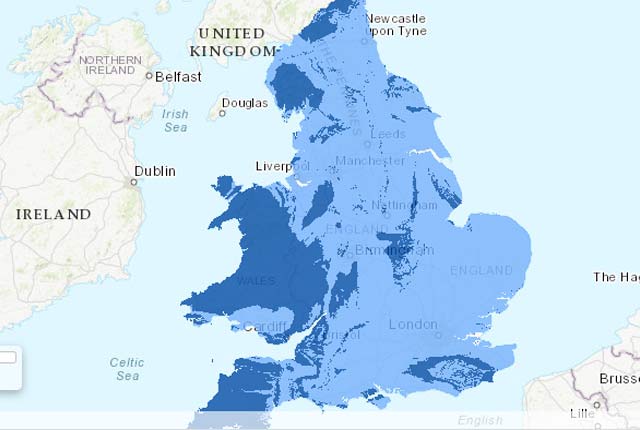
Open-loop GSHP screening tool
The BGS and the Environment Agency have together developed a web-based tool that maps the potential for open-loop ground-source heat pump installations in England and Wales.
You may also be interested in
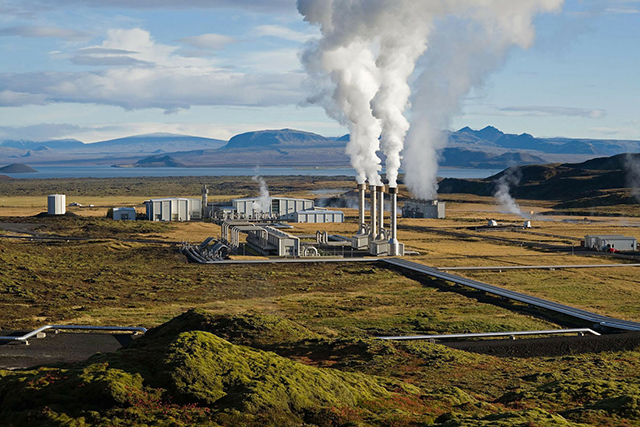
Geothermal energy
Investigating geothermal energy — energy stored in the form of heat beneath the surface of the solid Earth.
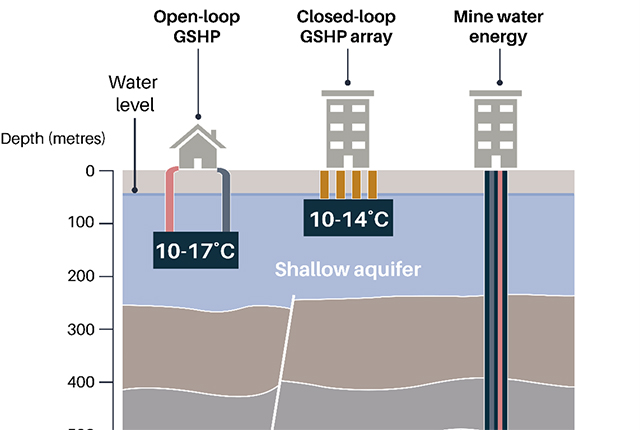
Geothermal technologies
Geothermal energy is available across the UK in different geological settings. It can be used to produce thermal (and in some places electrical) energy for a wide range of uses.
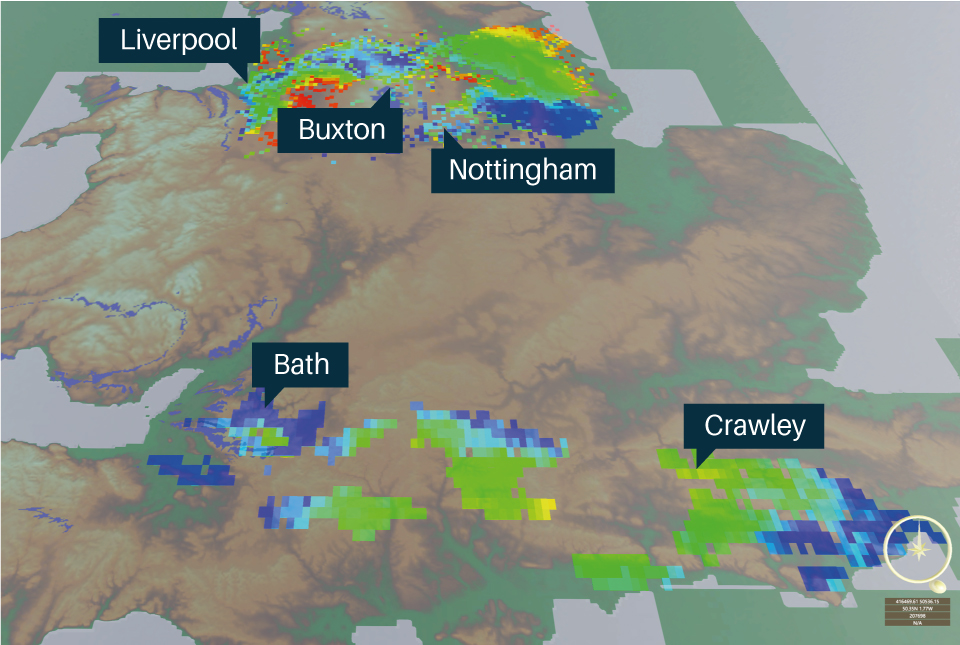
Applications
Geothermal energy resources occur in a broad range of geological settings. The BGS Geothermal team has experience in assessing and characterising shallow and deep geothermal resources.
Related news

Goldilocks zones: ‘geological super regions’ set to drive annual £40 billion investment in jobs and economic growth
10/06/2025
Eight UK regions identified as ‘just right’ in terms of geological conditions to drive the country’s net zero energy ambitions.
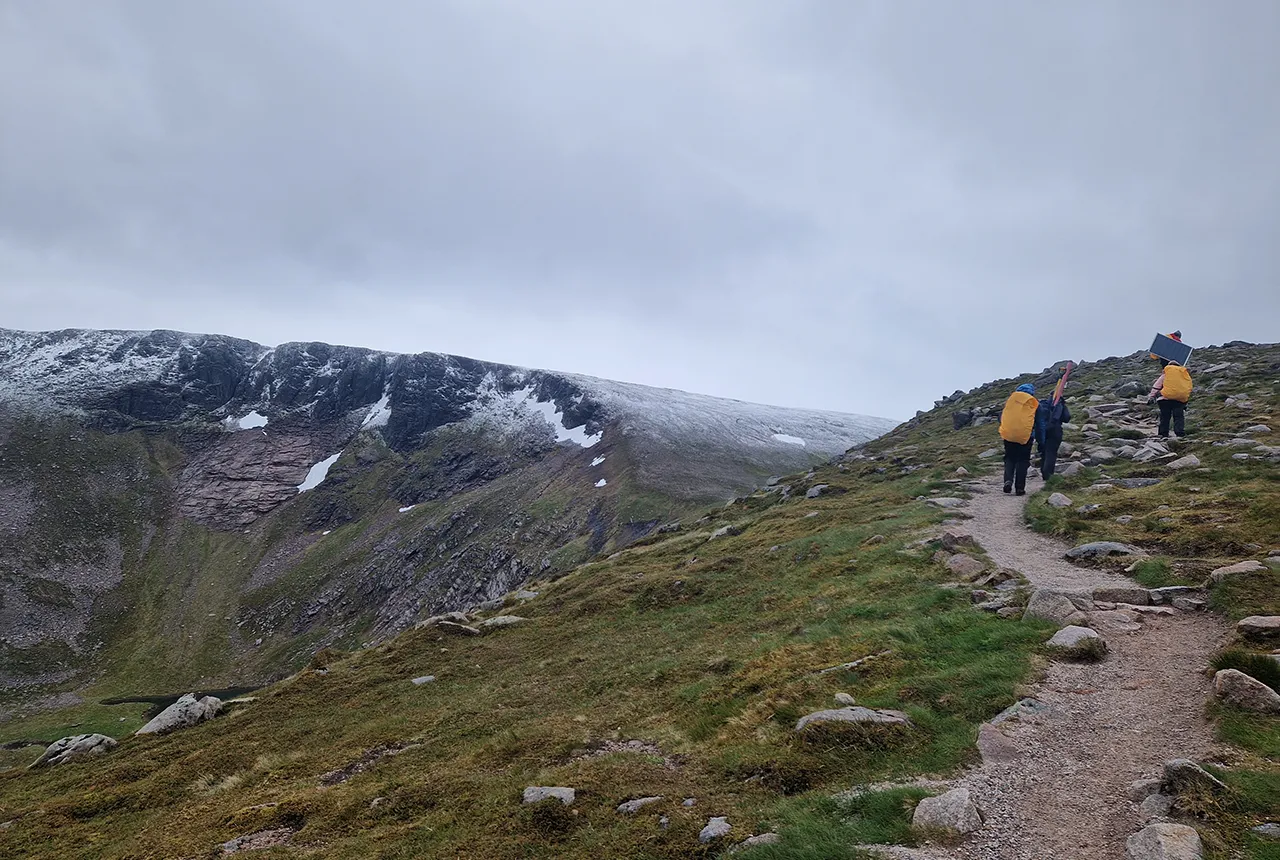
Exploring Scotland’s hidden energy potential with geology and geophysics: fieldwork in the Cairngorms
31/03/2025
BUFI student Innes Campbell discusses his research on Scotland’s radiothermal granites and how a fieldtrip with BGS helped further explore the subject.
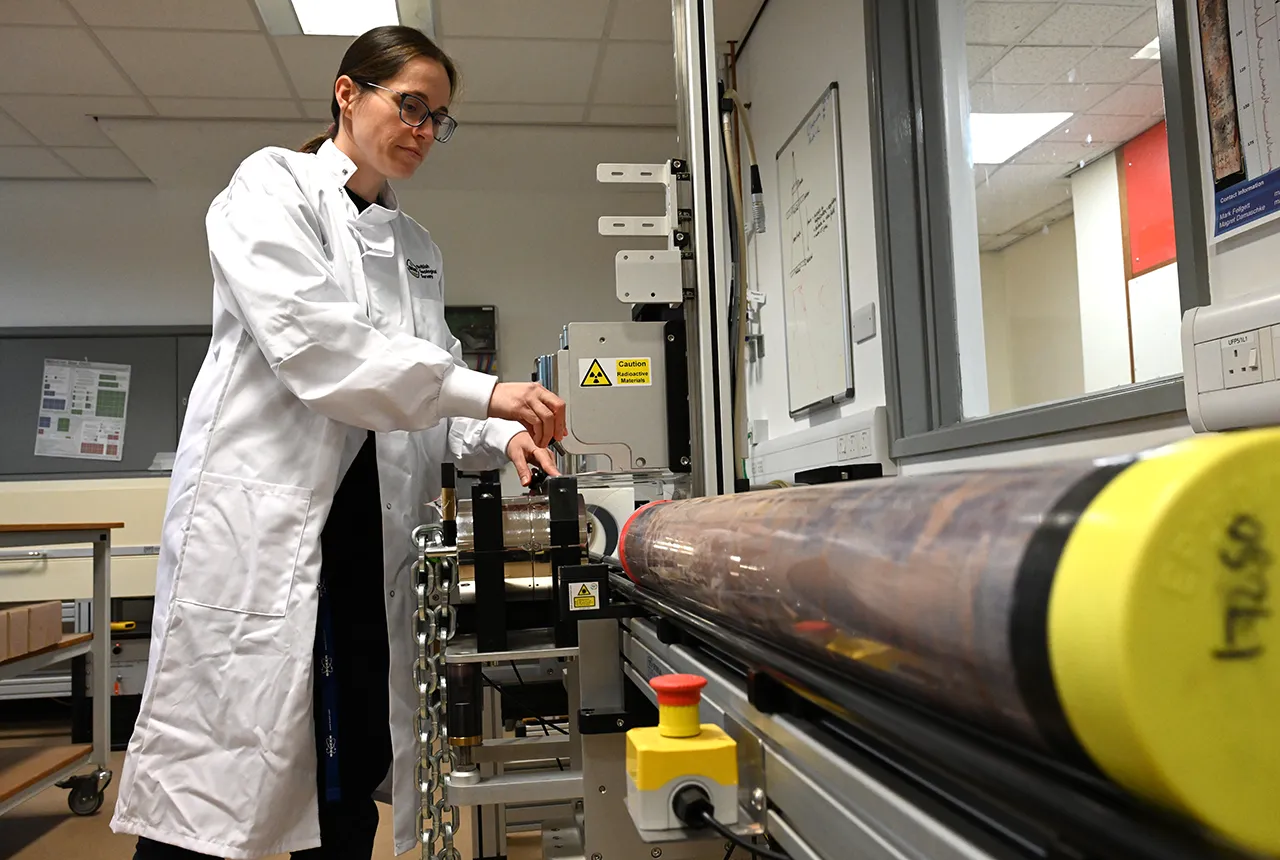
Prehistoric power: 250-million-year-old rocks could contain secrets to net zero future
05/12/2024
BGS has completed a comprehensive scan of Mercia Mudstone rocks that could hold geological secrets of the UK’s past and provide a boost for net zero.
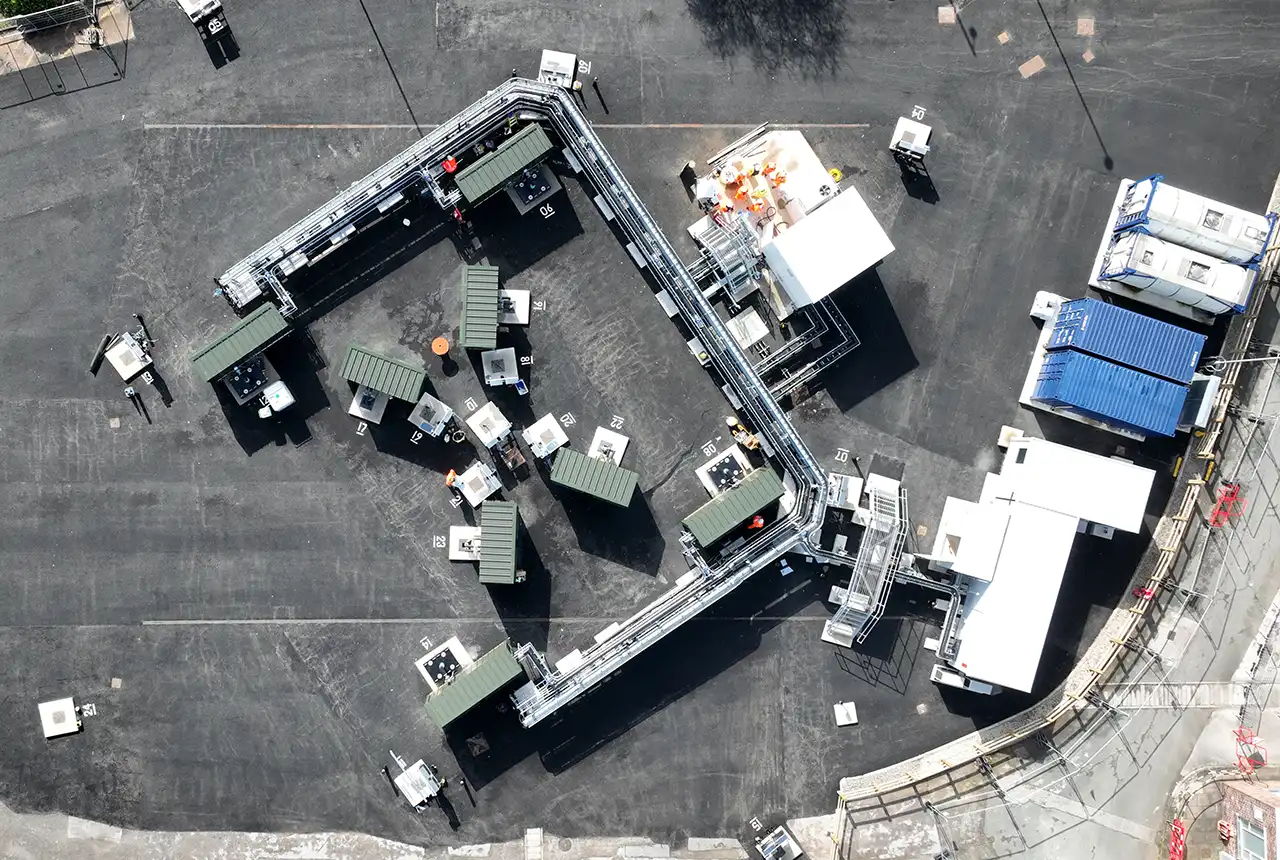
World-class facility creates new opportunities for geothermal energy in Cheshire
10/10/2024
The £8.3 million underground observatory will enhance the UK’s knowledge on the clean energy required to decarbonise heating.
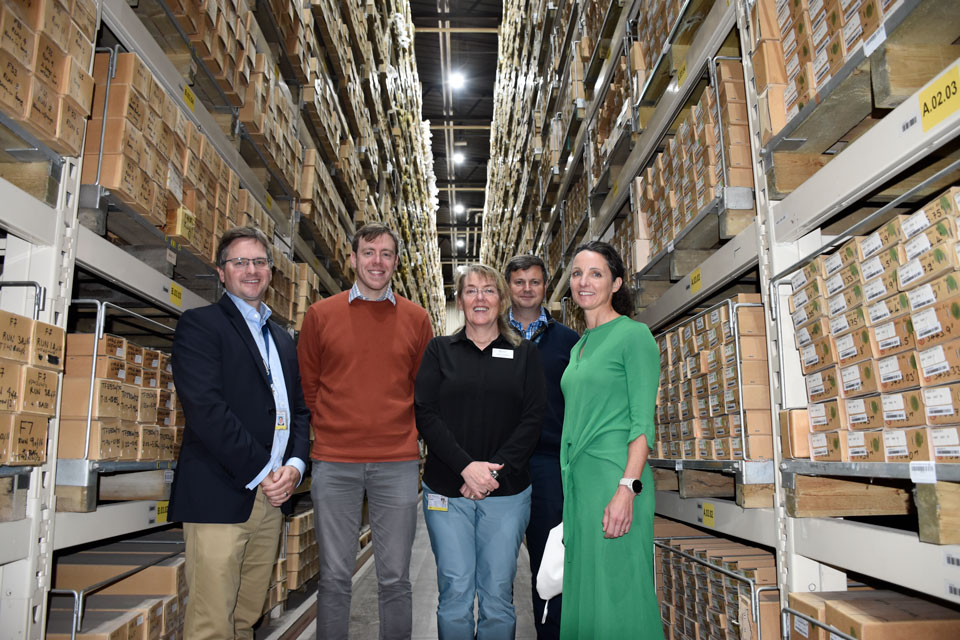
Local MP checks in on development of new geothermal ‘living laboratory’ in Nottinghamshire
19/09/2024
BGS has reached the halfway mark on its ambitious ground-source heat pump project at its headquarters in Keyworth, Nottinghamshire.
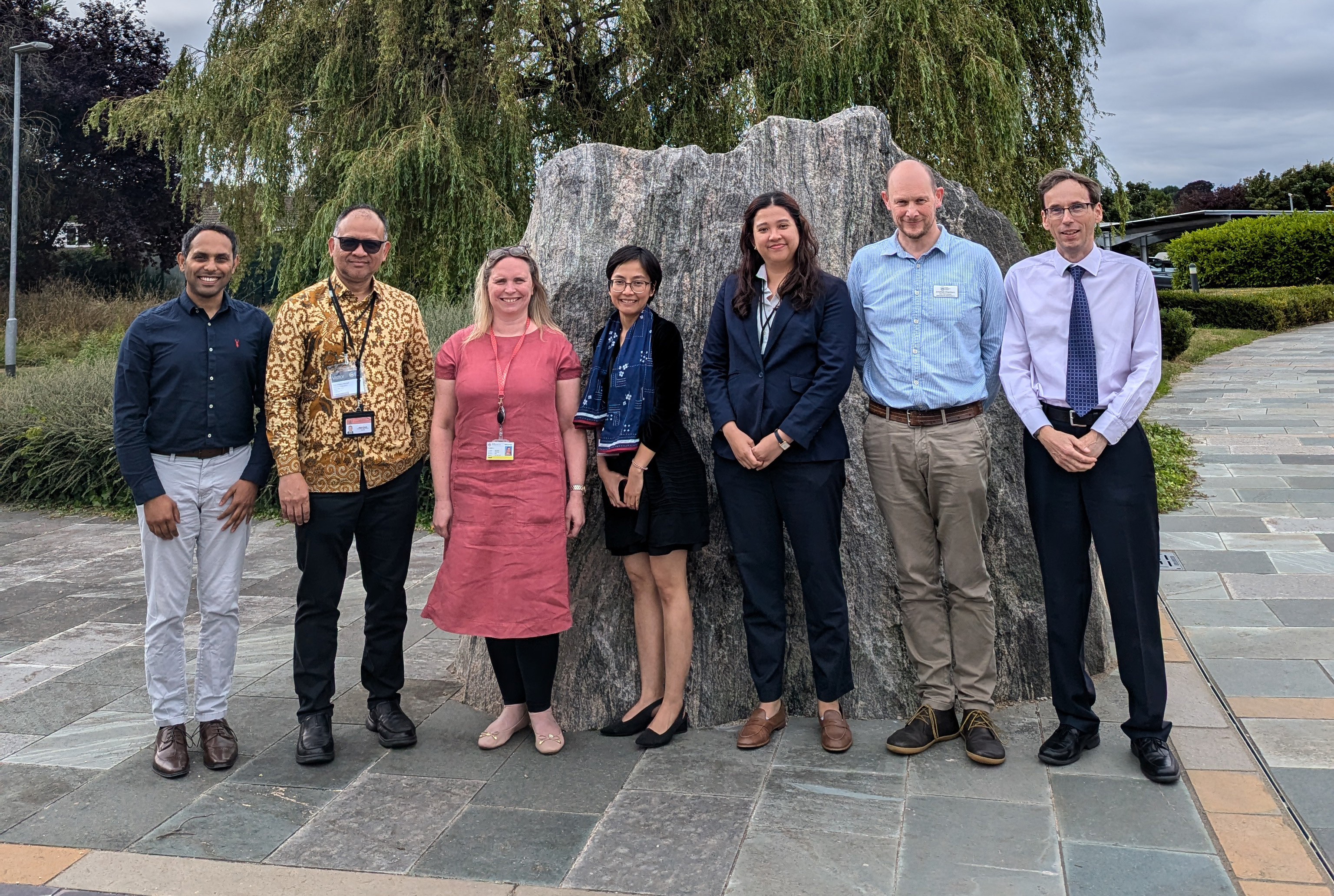
Visit by Indonesian Embassy representatives to BGS
27/08/2024
Strengthening BGS/Indonesia scientific research partnerships to address the complex challenges Indonesia faces from natural hazards and maximising opportunities from mineral resources and geothermal energy.
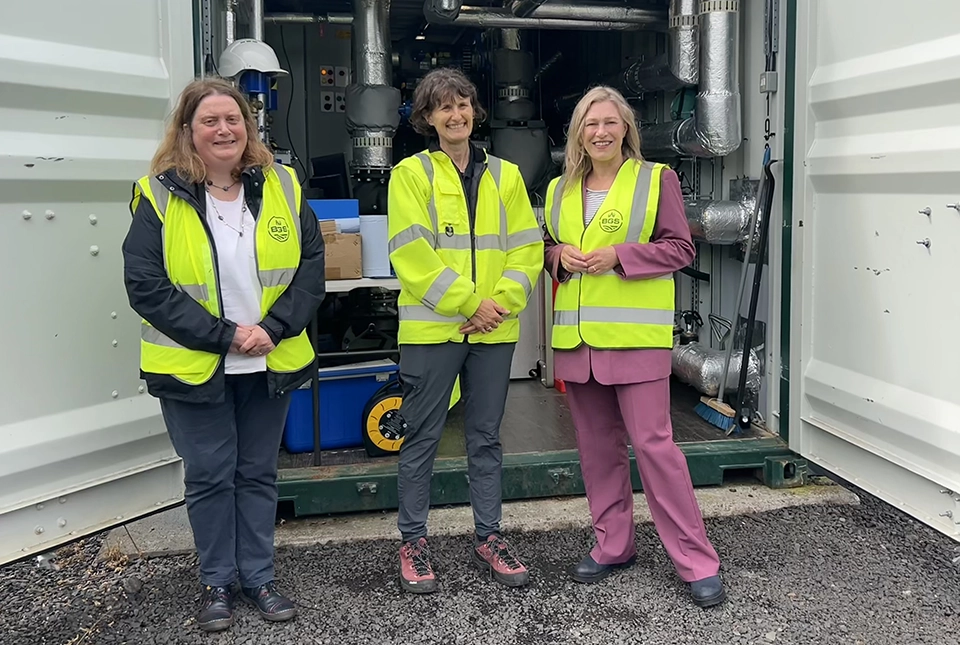
Unlocking our geothermal potential: a Scottish Government visit to the Glasgow Observatory
15/08/2024
Gillian Martin MSP visits the UK Geoenergy Observatory in Glasgow to learn about geothermal energy and see the research being carried out at the facility.
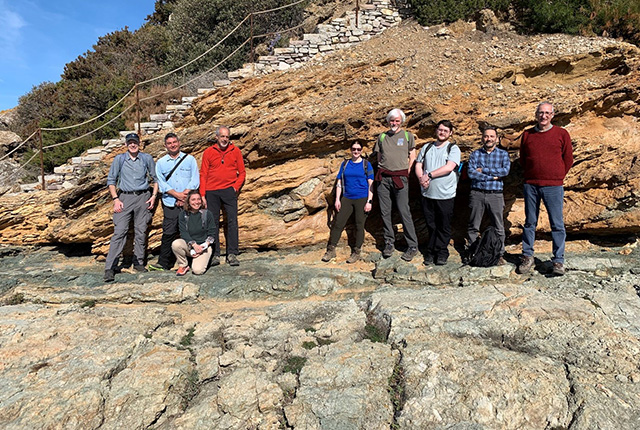
The heat beneath our feet: BGS field visit to Tuscan geothermal systems
05/07/2024
BGS visits the active and fossilised geothermal systems of southern Tuscany, Italy.
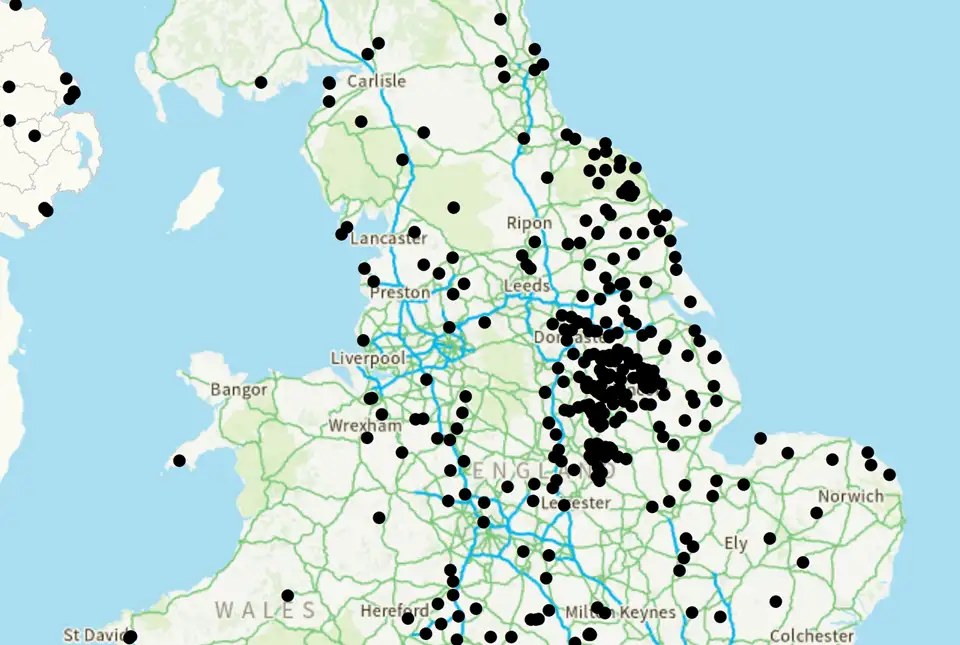
UK legacy geothermal catalogue released in digital format for the first time
18/04/2024
BGS has released the first digital version of the UK legacy geothermal catalogue of subsurface temperature measurements, rock thermal conductivity measurements and heat flow calculations.
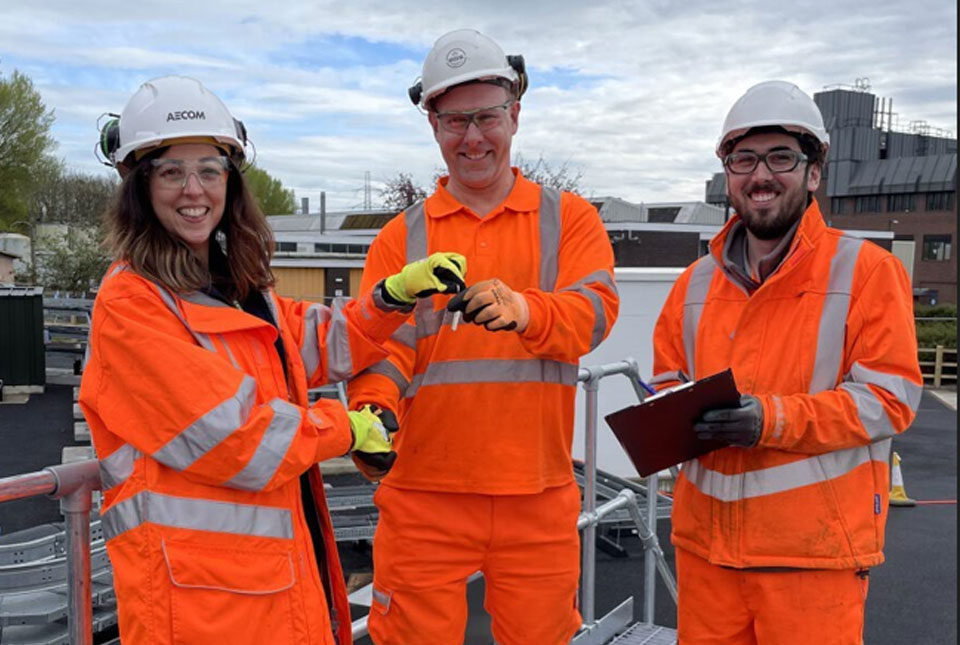
New underground observatory open for research
09/04/2024
Construction has been completed on the Cheshire Observatory and the facility is now open for research activities.
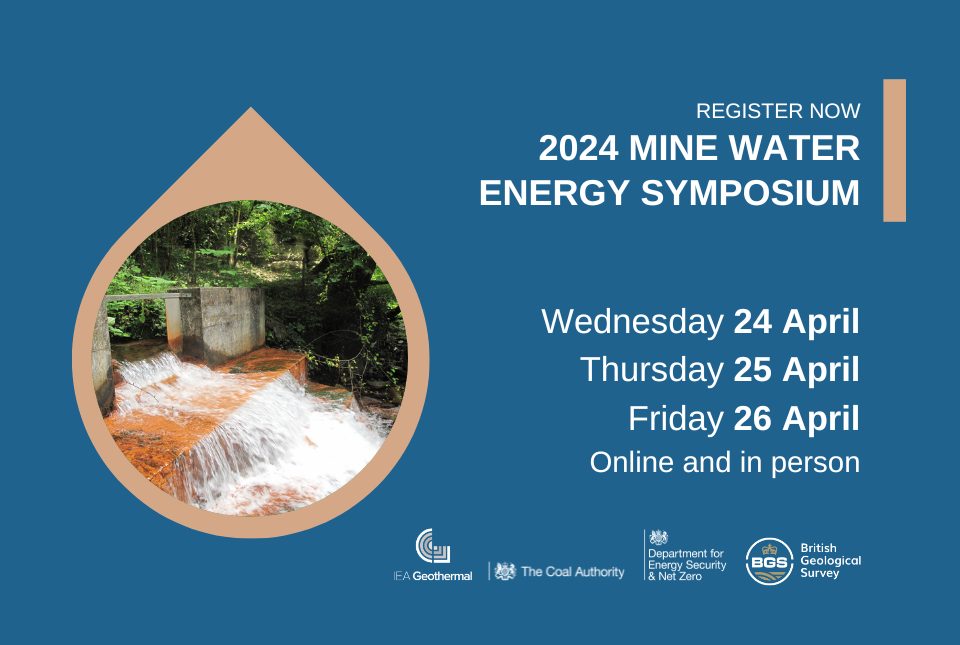
2024 Mine Water Energy Symposium
Event from 24/04/2024 to 26/04/2024
Now in its fourth year, the 2024 Mine Water Energy Symposium will be held in person for the first time in April 2024, with online streaming functionality.
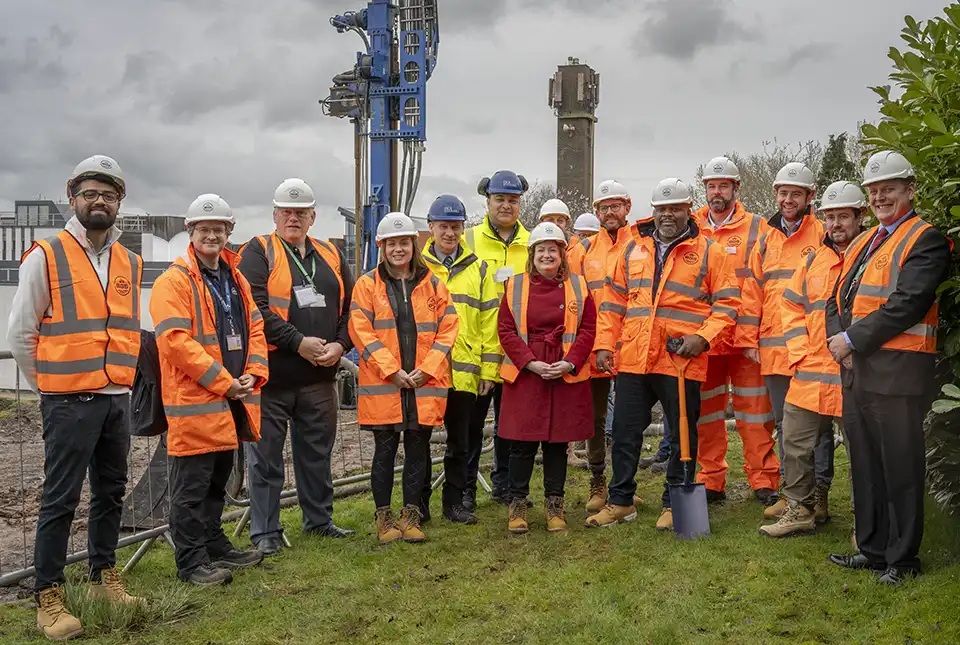
Local MP helps BGS launch a ‘living laboratory’
05/03/2024
BGS is implementing a low-carbon heating system to help meet its net zero targets and provide data to the public.

